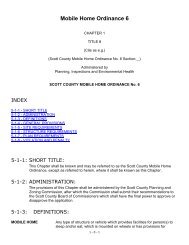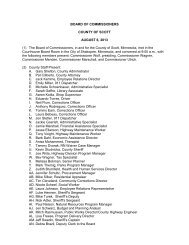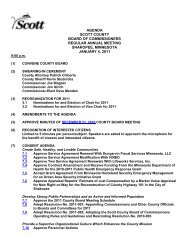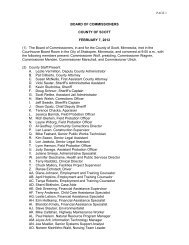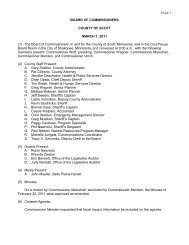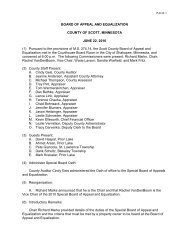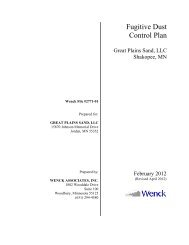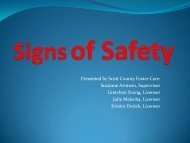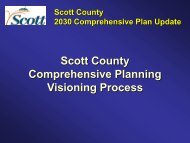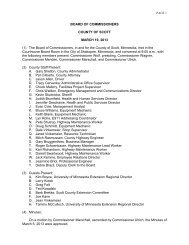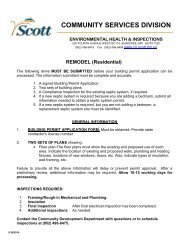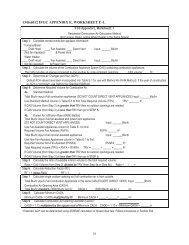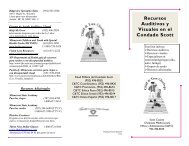Limited Phase 1 Environmental Site Assessment - Scott County
Limited Phase 1 Environmental Site Assessment - Scott County
Limited Phase 1 Environmental Site Assessment - Scott County
Create successful ePaper yourself
Turn your PDF publications into a flip-book with our unique Google optimized e-Paper software.
Bulk Storage PermitsThe Minnesota Department of Agriculture's Licensing Information System (LIS) lists individuals or companies who holdlicenses, certificates and/or permits required by state law and regulated by the Department. This database only containsthose LIS licenses related to anhydrous ammonia storage facilities and bulk pesticide/ fertilizer storage facilities. Pleasenote the data is real time and therefore constantly changing.VERSION DATE: 6/2009Concentrated Animal Feeding OperationsA Concentrated Animal Feeding Operation (CAFO) is any feeding operation with a capacity of 1,000 or more animal unitsaccording to federal animal unit calculations. The Minnesota Pollution Control Agency can also define a facility with lessthan 1,000 animal units as a CAFO on a case-by-case basis, depending on site conditions, and if manure or processwastewater is directly discharged to waters of the state. Facilities that are CAFOs must comply with both federalregulations and state rules. Two or more feedlots under common ownership are considered a single facility if they adjoineach other or use the same manure storage or disposal system.VERSION DATE: 3/2009ENVIRONMENTAL RECORDS DEFINITIONS - STATE (MN)Clandestine Drug Laboratory LocationsThis listing of clandestine methamphetamine laboratories is provided by the Minnesota Department of Health. Each methlab, spill or dump is a potential hazardous waste site, requiring assessment and remediation by experienced and qualifiedpersonnel. Former meth lab sites are being cleaned (or remediated) in many Minnesota communities. In thesecommunities, the cleanups are being guided by city and county ordinances, local housing laws, and Minnesota Statute145A, the Public Health Nuisance Statute.VERSION DATE: 11/2009Registered Drycleaning FacilitiesThe Minnesota Pollution Control Agency maintains this listing of registered dry cleaning facilities.VERSION DATE: 1/2010Closed LandfillsThe Minnesota Pollution Control Agency Closed Landfill Program (CLP) is a voluntary program established by thelegislature in 1994 to properly close, monitor, and maintain Minnesota's closed municipal sanitary landfills. Any MPCApermittedmixed-municipal solid waste landfill that stopped accepting mixed municipal solid waste (MMSW) by April 9,1994, and demolition debris before May 1, 1995, can qualify for application to this program.VERSION DATE: 11/2009Agricultural Contingency <strong>Site</strong>sThe Minnesota Department of Agriculture (MDA) Incident Response Unit (IRU) is the state lead agency for theinvestigation and remediation of incidents involving agricultural chemicals (pesticides and fertilizer). This MDA IRUdatabase includes sites with a soil or ground water contingency, deed restriction, local ordinance, restrictive covenant ordeed affidavit in place. The accuracy of these sites can be variable. In most cases, the site boundaries should beconsidered as only representing the vicinity of the soil or ground water contingency area or plume.VERSION DATE: 1/2010Contaminated Soil Treatment FacilitiesContaminated soil treatment facilities are places that the Minnesota Pollution Control Agency (MPCA) has approved orpermitted to take petroleum-contaminated soils from leak sites and provide treatment through a number of differentprocesses. The processes include thermal treatment (usually by roasting soils at high temperatures), composting, or thinspreadingsoils and allowing natural microorganisms to biodegrade the petroleum.VERSION DATE: 1/2010ENVIRONMENTAL RECORDS DEFINITIONS - STATE (MN)FeedlotsFeedlots may be small farms or large-scale commercial livestock operations. They are places where animals areconfined for feeding, breeding or holding. The Minnesota Pollution Control Agency (MPCA) and its county partners placerequirements on how manure is managed at feedlots, so that it does not contaminate nearby surface water andgroundwater.VERSION DATE: 1/2010Hazardous Waste Cleanup <strong>Site</strong>sSoil and or groundwater cleanup under RCRA Corrective Action is conducted by the <strong>Site</strong> Remediation Division of theMinnesota Pollution Control Agency. The Hazardous Waste Treatment, Storage, or Disposal Facilities enter the RCRAcorrective action program through the permitting process. Interim Status Facilities enter the RCRA Correction ActionProgram through a negotiated process initiated by the MPCA (these facilities at one time applied for a RCRA treatment,storage and or disposal permit, but did not complete the permitting process). Hazardous Waste Generators usually enter



